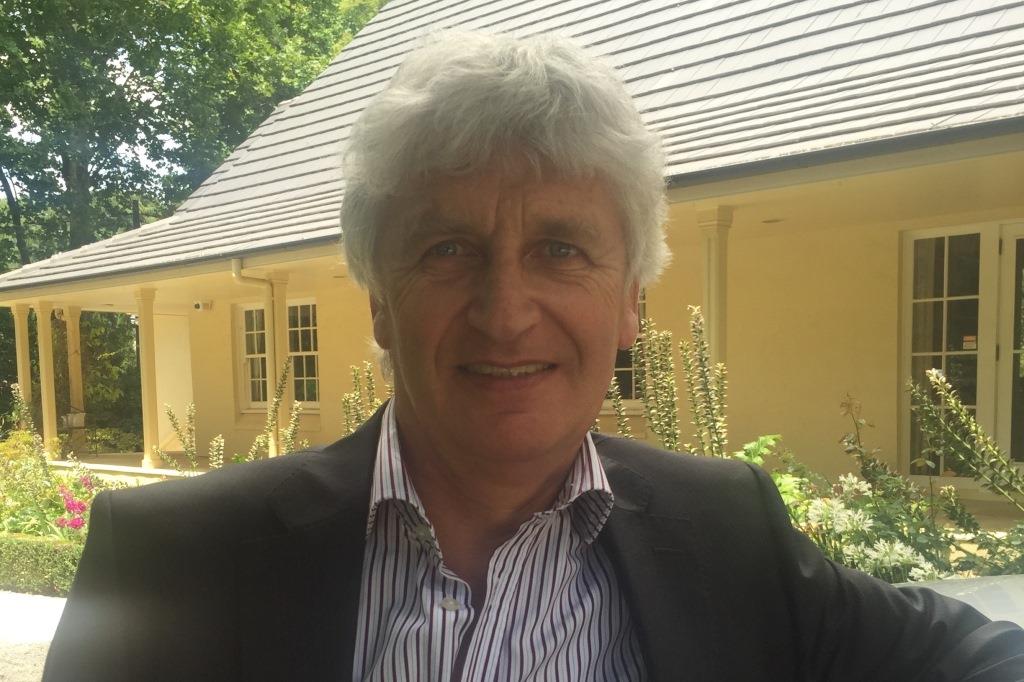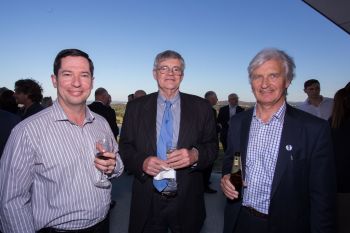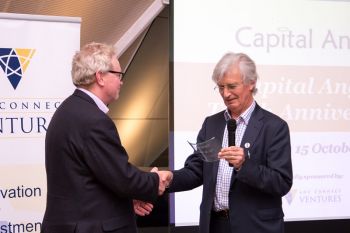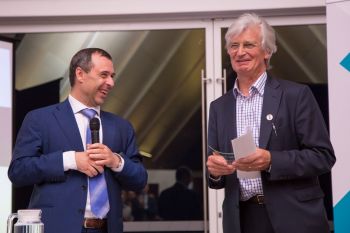
While the business is well known both in Canberra and interstate, we were specifically interested in talking to Uwe about his long term career as an active Angel investor in Australian start-ups.
PART ONE:
We asked Uwe what motivates him to invest.
"I have always been interested in technology. At school my vocational counsellor said I had an aptitude for science and suggested I study engineering, but in the end I became a lawyer. My wife did the same aptitude test and was told to be an engineer or a doctor but she became a philosopher. Our children on the other hand, are engineers".
Uwe laughs, "I guess I've applied that discipline and aptitude to investment".
It's no longer about the money for Uwe. What motivates him now is being involved with something that he is truly interested in – the product or solution.
"I have a real interest in environmental things," says Uwe. To him it is also important to like the people and there should be a strong collegiate spirit with everyone chipping in.
"If all those things come together and there is a chance it will make money – then I'm interested, but a straight money making thing is not what it's about. You would have to be extremely lucky to invest in one of these companies and make money quickly. It is about passion and long term commitment".
Uwe's initial foray into the space was through Epicorp Limited, an incubator set up by the Federal and ACT Government in 2000. Uwe says that essentially what happened was that in his role as a lawyer he was advising entrepreneurs on the deals they were entering into. He thought that sounded exciting and rather than simply documenting things on behalf of others he wanted to get involved. Uwe says that the real catalyst was a company called EOS (Electro Optic Systems).
"I did some work for them and I facilitated an arrangement where EOS did a back door listing on the stock exchange and I introduced the funder from Sydney to Ben Green of EOS and it kicked off. Overnight the share price went from 20 cents to 80 cents as a result of the deal being done".
 As the company's lawyer Uwe couldn't participate, but it triggered his interest in investment. "That's when I thought that I should have a go at doing this sort of thing myself".
As the company's lawyer Uwe couldn't participate, but it triggered his interest in investment. "That's when I thought that I should have a go at doing this sort of thing myself".
We asked Uwe what he looked for in terms of investment opportunities. "I started looking for opportunities like EOS. The first one I came across was an engineer who had an idea in relation to some fibre optic components. I thought that all sounded pretty good so we set up a company and he and I were the two directors of the company. I supplied all the money and he would supply the skills. Or at least he told me he would", says Uwe.
Things seemed to go well initially. Uwe did his due diligence and arranged some meetings with the Australian Technology Park in Sydney that had a number of good fibre optic companies there and he knew someone who had some real expertise.
"I ran the idea past this guy and he thought it all sounded very good. I decided to put some money in and persuaded a friend to put some money in and we started doing some development work".
Uwe says that about 9 months into the development there was a difference in expectations. The engineer partner said he had put a lot and time and effort into it and he thought he deserved to be paid. Uwe reminded him that the agreement was, he would put the money in and the engineer would develop the product. Originally it was supposed to take 3 months and then it was 9. He had also supplied more money than originally agreed.
"This made us both unhappy and eventually the company failed," said Uwe with a knowing smile.
We asked Uwe what lessons he learned early on that he tried not to repeat. Uwe says that while he has learned many lessons from all his investments, there were some very valuable ones from this first investment that he sees as key.
1. I didn't do any due diligence into my partners working history. We met, talked; we got along so we set up a company. If I had done my due diligence I probably would have picked up some early warning signs;
2. The founder had an idea that was pretty well developed, but there was nothing to prove the idea had value. I was effectively providing money to put into a physical form something he had developed in his head; and
3. It can't be just an idea and an individual, so that when something happens to that person the deal falls over.
In summary Uwe said that he would never invest in anything that is this early again.
"I invested far too early. I now believe that people have to do a lot of work and prove the value of an idea before they will attract funding".
In the next part of this interview we talk to Uwe about the advice he provides to first time investors.
PART TWO: Advice for the New Investor
In the first part of this interview we talked to Uwe about his experiences with investing and some of the lessons he has learned along the way. In this part of the interview we discuss some of the advice Uwe would provide to first time investors in the start-up space.
In the final part of this interview we discuss the advice he would provide to entrepreneurs seeking investment for the first time.
We asked Uwe if there is a typical investor profile. He doesn't believe so, "There are young investors, career professional investors like accountants and lawyers who are investing on the side and then you have people who have invested in themselves and have been successful and are now looking to other investment opportunities".
Uwe does say there are not many female investors which he thinks is a pity.
"And there is no clear reason as to why". Uwe went on to say that there are a few woman involved in the investment community who provide a range of important professional services but couldn't be considered as truly active investors. He has on occasion persuaded female investors to invest in companies he has invested in.
"These women have invested quite large amounts but prefer for this to be done on the quiet. If something is referred to them from a trusted source, they will look at it. Whether it's because women are more conservative about their investment activities or just prefer to engage in this activity quietly isn't really clear. They tend to prefer to sit on the perimeter of the investment scene and are always supported by someone they know and trust."

Uwe said there are a range of investors who prefer 'to fly under the radar" because they are busy and don't have time for the networking that can often go with identifying investment opportunities.
He says that they are interested in the idea and the people behind it and that is what motivates them to invest.
We asked what he tells a potential investor about what to expect and what the investment path might look like. Without hesitation Uwe responds that the initial investment is very much a first investment and there will be follow up rounds.
"With all probability the follow up rounds will keep coming at you," Uwe says with a knowing laugh, "and the whole thing might take many years".
Uwe's advice to anyone considering this path is that unless you have spare money that you can afford to lose and are prepared to be very patient, don't invest in this space.
We asked Uwe at what point he decides to walk away from an investment. Uwe said that if he likes the idea he will talk to people, if he likes the people he will put some money in. As the business develops and he sees signs of people being dogmatic or unrealistic with their expectations, he says then it starts to becomes difficult and you have to make a decision about whether you leave your money in as a passive investment and just walk away and eliminate unnecessary stress.
However, Uwe says, "There are cases where I have made a substantial commitment to the company and my friends and colleagues have also invested, I feel that my reputation is at stake so I don't walk away.
"I find some way to make it happen; I don't want to let people down."
He goes on to say that sometimes it may not be possible to save something but it wouldn't be for lack of trying.
In relation to new investments, Uwe says the decision to walk away is usually due to no interest in the idea, the space or lack of time. If time is the issue, he makes sure to provide feedback about whether he thinks it's a good idea.
Uwe discussed investing as an individual or as a group. He suggests for some small investments you can do them on your own, particularly when there is not much money or mentoring involved. Because Uwe in known as an experienced investor people often approach him directly and ask him whether he would like to invest in a particular company. Uwe makes an assessment and decides on the size of the investment. Then what tends to happen is that he talks about the investment with people that he has an association with and they do an investment off the back of that.
"It's rare that we make a decision to invest together or as a group". Uwe says others might have different experiences but this is the way it tends to work for him.
The common thread to all his investment is that they come through some sort of personal contact. They come from direct approaches in addition to the Angels network and its pitch events. We asked about the ones that approach Uwe directly and how he decides what to invest in. Uwe says it is often gut feel.
"If I don't want to invest in something I will still have a coffee with them and talk to them. We generally part on friendly terms and I try and leave them with useful advice as to who might be a potential investor, or some input into their valuation and what might need a bit more work". Uwe says that the network of investors, both formal and informal, has grown over the years.
"Of the initial investors of 10 -12 years ago, some are fully invested and some are still waiting for a return on those investments. To keep things going, new investors are moving in and the older ones aren't investing as much".
Uwe says that these new investors are learning on the job with the help of more established investors as mentors. Most are making smaller investments. Some early investors are doing very well and some are reinvesting their returns. He says that there is also a new breed of investor who is investing outside their own growing business. "It is an exciting time, but we need more new investors".
Uwe believes there is a lot of investment activity in Canberra at the moment. "The start-up infrastructure is so much more supportive of entrepreneurs and investors compared to 10 years ago when Capital Angels first started", says Uwe.
"In 2005 it was just a handful of people with common interests who would talk to each other; it was as informal as that".
Uwe goes on to say that there is now a range of programs and supporting activities, like Lighthouse. "There is publically available information and people can learn from sources including local successful investors, rather than on the "job" and lose money – like people did when I started out investing".
Courses like the Capital Angels Investment Masterclass are particularly important because investors are invited to share their stories. This is invaluable to new and would be investors. Uwe goes on to say that the ACT investment scene is all about sharing and is based on a spirit of goodwill. "No one is out to undermine anyone else in the space and this is quite different from other places".
Uwe shares a recent story of a company, not from the ACT looking to raise money. They engaged what Uwe calls a 'spruiker' to find the $1.5mil that they needed. This spruiker charged $30,000 upfront plus 6% of any money raised – to this day he hasn't raised a cent. "This happens a lot in other capital cities, but to my knowledge it doesn't happen in the ACT." Uwe believes this is because Canberra is a small community and if you try and rip anyone off everyone else will know about it and you become a pariah.
Uwe says that investing in companies outside of Canberra can create quite different challenges. He has invested in one company in Sydney which in the early days were very good at providing updates to shareholders, particularly when seeking more money.
"Over the years however they decided there was no need to keep shareholders updated. They didn't even hold shareholders meetings. Being in Sydney made it much more difficult to just walk in and ask what is going on and keep a check on things."
"These are some of the logistical challenges of investing outside of the ACT," says Uwe.
 PART THREE: Advice for the New Investee
PART THREE: Advice for the New Investee
In the first two parts of this interview with Uwe Boettcher we discussed how he became involved in investing in start-ups and the advice he would have for anyone else thinking of doing the same.
In the last part of the interview we discuss the other side of the conversation – the investment and how Uwe decides what makes a good investee.
We started this part of the interview by asking Uwe what are some of the early conversations he might have with an entrepreneur seeking investment. Uwe says his starting point is that he wants to fully understand what they have.
"I want to understand if what they are saying they are doing is possible". Uwe says that he tends to invest more in companies and entrepreneurs that develop things he can touch rather than software based products and services.
"This is my personal preference. I don't feel as comfortable in the software space. I like to be able to see and engage with a product that I have invested in."
Uwe then looks at the market strategy (the product/test market and the industry segment), then he wants to understand the potential in the Australian and international markets. Uwe says that he prefers to look at products that can at least demonstrate some international market potential.
When asked how he manages the expectations of a first time investee in terms of how hands-on the investor is going to be, Uwe says it depends on what is decided in the initial agreement. Uwe said that in many cases you can start with a hands-off investment that quickly becomes hands on because you need to save it.
Apparently this happens a lot. Uwe says that the best way to manage everyone's expectations is to discuss any issues that arise as early as possible – don't let them brew!
We then moved to the question of valuation and how you get investors and investees to agree and how investors put a value on something they are interested in.
While this is hard to answer in the abstract, Uwe looks at the potential of the company, how long it will take to get there, how much money it will gobble up in the process and how much time and effort has gone into the development to date. Uwe goes on to say, that if the company is a bit further down the track you can use a Discounted Cash Flow analysis, which he doesn't always apply.
"The reality is the future for many companies is so uncertain the assumptions you need to make means the end results are not really meaningful."
Uwe looks at team, their track record and whether they have done it before which means the chance of success is better and risk of failure lower. Uwe says if this is the case he'd be prepared to pay a bit more.
"There is no magic formula and a lot of it is based on gut feel and experience."
We asked how you explain this to entrepreneurs who rely on traditional and often inappropriate 'accounting' approach to valuation.
"The best way I have found is by referring to other valuation of other companies where there has been a realistic valuation. You can often find comparable companies that are a bit further down the track that have just raised money at a certain valuation", says Uwe.
"I would talk to the entrepreneur about that and I would say Company X – this is the product they have, this is the revenue they have and they are making a small profit or loss and they have been at it for 5 years and the pre money valuation of that company is $2mil and you haven't got anything near that and yet you are seeking pre money valuation of $2mil so there is something wrong with one or the other."
Uwe says this has been the only approach that has working for him in being able to explain the valuation process to an investee.
"Some investees get into the investment mind set straight away and you tend to build a good long term working relationship with them. But then there are others who don't understand, or don't want to understand, how the relationship will work and reality is and only fools invest in them and generally at too high a price".
He also says, that there are those in between that sometimes work and sometimes don't. "There are a lot of entrepreneurs that think it is the idea itself that is worth a lot of money – it isn't. What you need is an idea, but a key ingredient is the right people with the right attitude who don't run with unrealistic expectation and know that it will take a long time and a lot of hard work and setbacks. It is that talent with the idea and some money and mentoring that can create a successful company", says Uwe.
We told Uwe that many entrepreneurs we deal with don't want to give up any of their equity. Uwe says with a wry smile, you then don't get anything. We asked Uwe about what he tells young entrepreneurs about how investment can help a business grow.
Uwe says all you can do is use an actual example to show how it works. Uwe provided the following example: if you have a pre money value of $1mil and you are talking about a 20% investment, it costs me $200K to get in and the entrepreneur's stake is now 80%. If down the track follow on investment is required their stake is substantially reduced but with the investor's help you can grow the company to $100mil, even if you only own 10% of the company, your shares are now worth $10mil. Compare this with owing 80% before that was worth $1m. So your percentage of shares has reduced but the value has increased significantly. Uwe says to achieve this you need to be prepared to be diluted.
"While most accept this logic, there are the control freaks, which won't. In which case, I will walk away from the deal."
We then discussed the founder syndrome and how he deals with this. Uwe says that on the whole he hasn't had too many issues with this, but he does know people who have.
"I have a lot of experience in mediation and coaching and use these skills in my board roles."
We asked what advice he would provide a first time investor who didn't have the experience or the skills. He believes that if the investor doesn't know how to deal with that situation they should get some help.
"Most of the time if you handle people appropriately you will avoid a confrontation. But if you do have a confrontation and you don't have the knowledge or experience to manage it, get someone else in to de-escalate it".
Uwe said just recently, he has mediated a situation where someone came to him sand said she had put $200K into a single founder company. The investor had been made all sorts of promises and in the end was asked to make a cheque to the founder not the company and the shares hadn't been issued as promised.
Uwe did a bit of research on the founder and suggested that the best course of action was that he make contact with the founder's lawyer and have a chat to find a way to de-escalate the situation and arrive at a solution.
"After two meetings we came up with a settlement deal that was a loan agreement for the repayment of the original amount plus a bit of interest – everyone walked away happy", says Uwe.
Another case that Uwe has worked on involves serious tensions between three directors and the three major shareholders. "They need to find a pathway forward to remove the troublesome director because they know that the relationship isn't salvageable - do we buy him out or do we find another investor to buy him out?"
"In cases like this," says Uwe, "you have to make a decision to either back off or remove the problem child".
About Lighthouse Business Innovation Centre
Lighthouse has a strong track record of supporting entrepreneurs, researchers and inventers on the path from concept to commercialisation. Since July 2008, Lighthouse has worked with over 990 distinct enterprises and provided group and peer based services to over 3400 enterprises and individuals. For over five years Lighthouse has successfully delivered business advice, education, mentorship and networking opportunities to help these businesses commercialise their ideas and grow their companies. Lighthouse also delivers programs such as the ACT Microcredit Program for the ACT Government. Visit www.lighthouseinnovation.com.au for more information.


